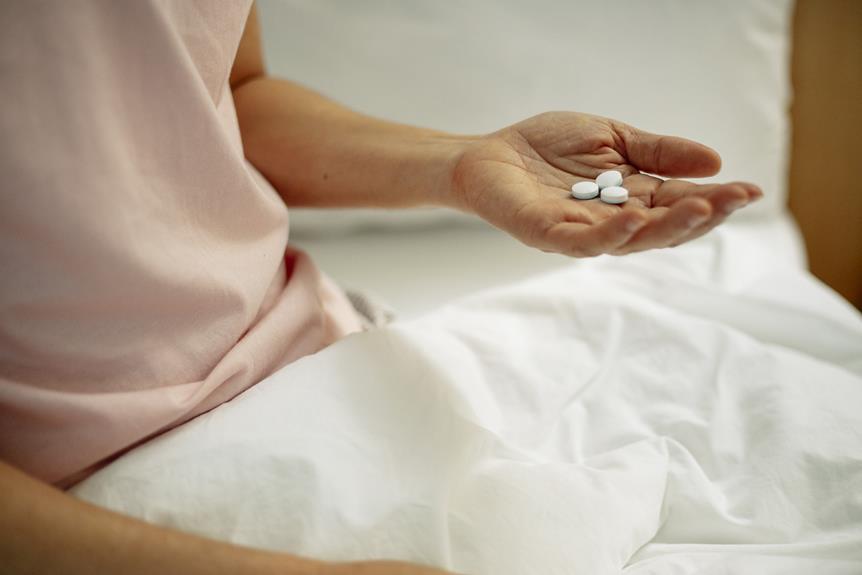Is Premenstrual Syndrome (PMS) and How to Alleviate Symptoms

Premenstrual syndrome (PMS) affects millions of women worldwide, causing a range of physical and emotional symptoms that can disrupt daily life.
In this article, we will delve into the complexities of PMS, exploring common symptoms and offering practical solutions to alleviate its impact.
By making simple lifestyle changes, adopting a balanced diet, engaging in regular exercise, and exploring natural remedies, women can find relief from the challenges posed by PMS.
Let us empower you with knowledge to effectively manage and overcome these symptoms.
Key Takeaways
- PMS is caused by hormonal changes during the menstrual cycle, leading to physical and emotional symptoms.
- Understanding the hormonal changes during PMS helps healthcare professionals provide appropriate support.
- Alleviating physical PMS symptoms can be achieved through maintaining a healthy diet, regular exercise, and getting enough rest.
- Managing emotional PMS symptoms involves practicing self-care activities, maintaining a healthy lifestyle, and building a support system.
Understanding Premenstrual Syndrome (PMS
The article provides an in-depth analysis of the causes and symptoms of premenstrual syndrome (PMS). Understanding the causes of PMS is crucial in order to serve individuals who experience this condition.
PMS is primarily caused by hormonal changes that occur during the menstrual cycle. These changes can lead to imbalances in serotonin levels, resulting in mood swings, irritability, and anxiety. Additionally, fluctuations in estrogen and progesterone levels can cause physical symptoms such as bloating, breast tenderness, and fatigue.
By understanding the underlying hormonal changes during PMS, healthcare professionals can better empathize with their patients and provide appropriate support and treatment.
Moving forward, let's delve into the common symptoms of PMS and explore strategies for alleviating them.
Common Symptoms of PMS
Premenstrual Syndrome (PMS) is a condition that affects many women, causing a range of physical and emotional symptoms.
Common physical symptoms include bloating, breast tenderness, and fatigue.
Emotional symptoms may include mood swings, irritability, and anxiety.
Understanding these common symptoms is essential in finding effective ways to alleviate the discomfort associated with PMS.
Physical PMS Symptoms
Experiencing bloating and breast tenderness are common physical symptoms that women may encounter during the menstrual cycle. These symptoms can cause discomfort and affect daily activities. However, there are ways to alleviate PMS symptoms and make this time more bearable:
- Maintain a healthy diet: Consuming a balanced diet rich in fruits, vegetables, whole grains, and lean proteins can help reduce bloating and inflammation.
- Regular exercise: Engaging in physical activity, such as walking, swimming, or yoga, can help relieve tension and improve mood.
- Get enough rest: Prioritizing sleep and relaxation can help reduce fatigue and irritability associated with PMS.
- Manage stress: Practicing stress management techniques, such as deep breathing exercises or meditation, can help alleviate PMS symptoms.
- Seek support: Talking to friends, family, or a healthcare provider about PMS symptoms can provide emotional support and helpful advice.
Emotional PMS Symptoms
Women often struggle with managing their emotional well-being during the menstrual cycle, as feelings of irritability and mood swings can significantly impact daily life. Emotional symptoms of premenstrual syndrome (PMS) can include anxiety, depression, mood swings, and increased sensitivity. It is important for women to develop effective coping strategies to manage these emotions and maintain a positive mindset.
One helpful strategy is practicing self-care. Engaging in activities that promote relaxation and reduce stress, such as exercise, meditation, or journaling, can help manage emotions during this time. It is also beneficial to maintain a healthy lifestyle by eating a balanced diet, getting enough sleep, and avoiding caffeine and alcohol.
Building a support system can also be instrumental in managing emotions during the menstrual cycle. Talking to trusted friends, family members, or a therapist can provide a safe space to express feelings and receive guidance.
Overall, managing emotions during the menstrual cycle requires self-awareness, self-care, and a strong support system. By implementing these coping strategies, women can navigate the emotional challenges of PMS and maintain their well-being.
Natural Remedies for PMS
What are some effective natural remedies for alleviating the common symptoms of PMS, and how can they be incorporated into a comprehensive treatment plan?
- Herbal supplements: Incorporating herbal remedies such as chasteberry, evening primrose oil, and black cohosh into one's daily routine may help alleviate PMS symptoms.
- Dietary changes: A diet rich in whole grains, fruits, and vegetables, and low in processed foods and caffeine can help reduce bloating, mood swings, and fatigue.
- Regular exercise: Engaging in regular physical activity, such as walking, yoga, or swimming, can improve mood, reduce stress, and alleviate physical discomfort associated with PMS.
- Stress management techniques: Incorporating stress reduction techniques like meditation, deep breathing exercises, and relaxation techniques can help manage emotional and physical symptoms of PMS.
- Adequate sleep: Prioritizing quality sleep by establishing a consistent sleep routine and creating a relaxing sleep environment can improve overall well-being and reduce PMS symptoms.
Lifestyle Changes to Alleviate PMS Symptoms
Implementing certain lifestyle changes can significantly alleviate the symptoms of PMS. Regular exercise has been shown to reduce the severity of PMS symptoms, as it helps regulate hormonal fluctuations and improves mood.
Additionally, making dietary changes such as reducing salt and sugar intake and increasing consumption of whole grains and fruits can also provide relief from PMS symptoms.
Exercise for PMS Relief
Engaging in regular physical activity can significantly reduce the severity of PMS symptoms. Exercise has been shown to alleviate mood swings and promote overall well-being during the menstrual cycle. Incorporating exercise into your routine can provide numerous benefits for managing PMS. These benefits include increased release of endorphins, which can improve mood and reduce feelings of depression and anxiety. Exercise also improves blood circulation and reduces inflammation, helping alleviate physical discomfort such as bloating and breast tenderness. Additionally, exercise enhances energy levels and reduces fatigue, combating PMS-related exhaustion. It also reduces stress and improves sleep, contributing to a more balanced emotional state. Furthermore, exercise increases self-confidence and body positivity, improving overall well-being and self-esteem.
Dietary Changes for PMS
In addition to exercise, making dietary changes can also help alleviate PMS symptoms and improve overall well-being during the menstrual cycle.
Healthy eating and proper nutrition play a crucial role in managing hormonal imbalances and reducing the severity of symptoms experienced during PMS. Incorporating nutrient-rich foods such as fruits, vegetables, whole grains, and lean proteins into your diet can provide essential vitamins and minerals that support hormone regulation and enhance mood stability.
Additionally, reducing the consumption of processed foods, caffeine, and alcohol can help minimize bloating, irritability, and fatigue commonly associated with PMS.
It is important to listen to your body's needs and fuel it with nourishing foods to promote optimal well-being. Consulting with a healthcare professional or registered dietitian can provide personalized guidance on creating a balanced diet plan tailored to your specific needs during the menstrual cycle.
Dietary Recommendations for PMS Relief
The article discusses the dietary recommendations for PMS relief, highlighting the importance of incorporating specific foods into one's diet to alleviate symptoms. Proper nutrition plays a crucial role in managing PMS symptoms and promoting overall well-being.
Here are some nutrition tips to help alleviate PMS symptoms:
- Increase intake of complex carbohydrates such as whole grains, fruits, and vegetables, which can help regulate mood and reduce irritability.
- Incorporate foods rich in calcium and vitamin D, such as dairy products, leafy greens, and fortified cereals, to alleviate bloating and support bone health.
- Consume foods high in omega-3 fatty acids, such as fatty fish, flaxseeds, and walnuts, to reduce inflammation and ease breast tenderness.
- Include foods containing magnesium, such as nuts, seeds, and legumes, which can help relieve muscle aches and headaches.
- Consider herbal remedies like chasteberry, evening primrose oil, and ginger, which have been shown to reduce PMS symptoms.
Exercise and Physical Activity for PMS Management
Regular exercise, such as walking or swimming, can help alleviate PMS symptoms by reducing stress and improving mood. Exercise benefits women experiencing PMS in multiple ways.
Physical activity releases endorphins, which are natural mood boosters, and helps reduce anxiety and depression associated with PMS. Additionally, exercise improves blood circulation, which can reduce bloating and fluid retention. Engaging in regular exercise also helps regulate hormone levels, which can alleviate symptoms such as breast tenderness and mood swings.
However, not all exercises are equally effective for managing PMS. The best exercises for PMS include aerobic activities like jogging, cycling, and dancing, as they increase heart rate and release endorphins. Strength training exercises like weightlifting or yoga can also be beneficial for improving muscle strength and flexibility.
Overall, incorporating regular exercise into a PMS management routine can provide significant relief from symptoms and enhance overall well-being.
Natural Remedies and Supplements for PMS Relief
While there is limited scientific evidence supporting their efficacy, natural remedies and supplements, such as evening primrose oil or chasteberry, can provide relief from PMS symptoms. These herbal remedies for PMS have been used for centuries and are believed to help balance hormones and reduce inflammation.
Stress management techniques have also been found to alleviate PMS symptoms. Some strategies include practicing relaxation exercises like deep breathing and meditation, engaging in regular physical activity, getting enough sleep, and maintaining a healthy diet.
It is important to note that individual experiences may vary, and it is advisable to consult with a healthcare professional before starting any herbal or supplement regimen.
Seeking Professional Help for Severe PMS Symptoms
Consulting with a healthcare professional is recommended for individuals experiencing severe PMS symptoms in order to explore potential treatment options. While natural remedies and supplements can be helpful for milder symptoms, severe cases may require professional therapy and medication options.
A healthcare professional can accurately diagnose the severity of the symptoms and develop a personalized treatment plan. Professional therapy can involve cognitive-behavioral techniques to address emotional and psychological aspects of PMS, while medication options such as hormonal birth control or selective serotonin reuptake inhibitors (SSRIs) can help regulate hormones and manage mood swings and physical discomfort.
It is important to consult with a healthcare professional to discuss the potential benefits and risks of these treatment options, as well as any potential interactions with other medications or health conditions. By seeking professional help, individuals can find relief from severe PMS symptoms and improve their overall quality of life.
Frequently Asked Questions
How Does PMS Affect Mental Health?
Premenstrual Syndrome (PMS) can significantly impact mental health, contributing to symptoms of depression and anxiety. Hormonal fluctuations during the menstrual cycle can trigger emotional changes, exacerbating existing mental health conditions. Seeking support from healthcare professionals can alleviate these symptoms.
Can PMS Symptoms Vary From Month to Month?
Yes, PMS symptoms can vary from month to month. This is because PMS is closely linked to the menstrual cycle, and hormonal fluctuations during this time can result in different symptoms and intensities.
Are There Any Specific Foods That Can Worsen PMS Symptoms?
Certain foods can exacerbate PMS symptoms. It is recommended to avoid caffeine, alcohol, salt, and processed foods, while incorporating a balanced diet rich in fruits, vegetables, whole grains, and lean proteins to help manage PMS symptoms.
Is There a Specific Exercise Routine That Is Most Effective in Managing PMS Symptoms?
Engaging in a regular exercise routine has been found to be one of the most effective ways to manage PMS symptoms. Additionally, alternative therapies such as yoga and acupuncture have shown promising results in alleviating discomfort.
What Are the Available Treatment Options for Severe PMS Symptoms?
Treatment options for severe PMS symptoms include lifestyle changes, such as regular exercise and a balanced diet, along with over-the-counter pain relievers like ibuprofen. In more severe cases, hormonal birth control or antidepressants may be prescribed.








